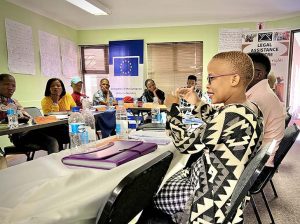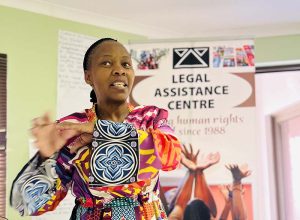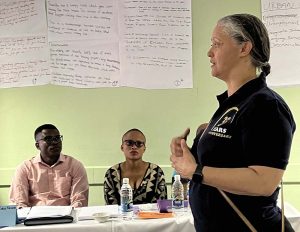 Empowering the San: Legal Capacity building for Human Rights
Empowering the San: Legal Capacity building for Human Rights
Successful Paralegal Induction Training in Windhoek
We are delighted to report on the successful completion of the Induction Training for paralegals serving San communities, held between September 9 to 13, 2024.
This essential community capacity-building initiative, generously funded by the European Union (EU), designed to enhance the legal knowledge and advocacy skills of participants, thereby empowering marginalized San communities throughout Namibia.
The project, which commenced in late 2023, was activated this year following an impactful two-day inception workshop on June 19-20, 2024, in Windhoek. The workshop gathered Chiefs, San community members, traditional leaders, government officials, civil society organizations, and rights activists, all dedicated to supporting this vital initiative. Their invaluable insights helped shape the paralegal training programme now fully underway.

Building Capacity Through Diverse Representation
Following the inception workshop (above photo), the LAC initiated a recruitment process resulting in the selection of twelve (12) trainee paralegals from diverse San communities across Namibia. This carefully curated group exemplifies the project’s commitment to inclusivity and representation. The training sessions were designed to empower these community-based trainee paralegals in effectively supporting their respective communities to advocate effectively for the rights of the San people. The training was delivered in a highly participatory manner, allowing for active participation, the sharing of ideas and experiences, and creating a comfortable atmosphere where everyone’s contributions were nurtured.
Participants engaged in group discussions, fostering an inclusive learning environment.
Legal Empowerment Through Education
The training emphasized the significance of legal empowerment, equipping participants with essential tools to navigate legal systems. Through intensive sessions focused on legal frameworks, human rights education, and practical advocacy strategies, participants gained a solid foundation for future community engagement.
Topics covered included community dynamics, human rights, land rights, access to education, health care, and cultural preservation. Engaging in role-playing exercises and case studies, participants actively applied their new knowledge, preparing for real-life legal scenarios in their communities.
Trainees participated in role-playing exercises to simulate real-life advocacy, information sharing and legal challenges.
A Commitment to Human Rights
The EU’s financial backing highlights its dedication to uplifting marginalized groups in Namibia, aligning with its goals of enhancing legal capacities and promoting inclusive development. The LAC shares this commitment and is a logical partner to the EU in implementing this initiative.
Looking Ahead
The induction training marks the beginning of a series of capacity-building workshops aimed at fostering collaboration among stakeholders. The skills acquired by the trainee paralegals are expected to lead to significant outcomes in San communities. Continuous feedback from participants will be crucial in refining future interventions tailored to their specific needs.
The “Empowering the San” project represents a pivotal step toward meaningful change, fostering resilience, and ensuring that the voices of the San people are heard and respected within the legal system.
Later in the year, a follow-up training will be hosted in one of the regions, possibly in the Omaheke Region. This is crucial, as it will provide an opportunity for trainee paralegals to be exposed to other parts of the country, making the training field-based and practical. It will also allow Omaheke-based participants to showcase development initiatives while sharing their concerns and challenges. LAC facilitators will use this experience to enrich the programme’s training content, facilitating mutual learning among participants and their communities.
Inquiries:
Ms Corinna Van Wyk, Lead Project Coordinator, Legal Assistance Centre (LAC), Tel: +264 (0) 61 22 33 56, Email: cvanwyk@lac.org.na
Mr Twaku Kayofa, Press Officer, EU Delegation to Namibia, Tel: +264 (0) 61 290 6247, Email: Twaku.Kayofa@eeas.europa.eu















